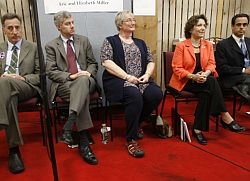 (Host) The Democratic gubernatorial race is in high gear as the five candidates crisscross the state in search of votes.
(Host) The Democratic gubernatorial race is in high gear as the five candidates crisscross the state in search of votes.
Most political analysts believe that as few as 50,000 Vermonters will vote in the August 24th primary.
As VPR’s Bob Kinzel reports, the campaigns know the key to winning will be finding those voters and making sure they cast a ballot.
(Kinzel) If the turnout predictions are accurate, the wining candidate needs to get roughly 15,000 votes. It’s a small enough number to be able to identify practically every voter.
And that’s what the campaigns are doing. But their approaches are a study in contrasts.
This week, Peter Shumlin became the first candidate to hit the TV airwaves. He chose a theme used by UPS. Standing in front of a white board featuring an outline of the state of Vermont, Shumlin draws arrows connecting his core issues to the state map:
(Shumlin TV Spot) "I’m running for governor because putting Vermonters back to work will take some bold strokes. … To find out how I’ll get it done, visit my website. I hope you’ll get drawn in."
(Kinzel) Shumlin says his goal is to get his message out to as many Vermonters as possible.
(Shumlin) "I think organization is going to be very important to win this primary. But I think the most important piece is actually going to be the candidate who can articulate a vision where Vermont needs to go."
(Kinzel) Early voting for the primary begins on Monday. Retired Middlebury College political science professor Eric Davis says all the campaigns will encourage their core supporters to vote as soon as possible.
Davis says an early TV campaign could help influence some who haven’t made up their minds, yet.
(Davis) "Some of those people may still be open to persuasion, haven’t yet made up their minds who they’ll support. So a media advertising campaign in July might very well be important to get those people who will be voting in early August."
(Kinzel) Davis wonders if Shumlin’s decision to use early TV will influence other campaigns. Most insist it won’t.
Paul Tencher is the campaign manager for Deb Markowitz. He says the campaign already has four paid staff members in the field because he feels voter ID is the key to winning – not early TV:
(Tencher) "It’s the way that campaigns should work. It’s grassroots activism at its best. And it’s how Vermonters really want to hear from their candidates for office. They want to hear from them directly, but they also want to know the views of their neighbors."
(Kinzel) John Bauer runs the campaign of Susan Bartlett. This campaign doesn’t have the financial resources of the others, but he says it’s allocated money for three field directors to help identify voters:
(Bauer) "That is our focus, is building an organization of supporters. And, you know, it’s not easy because we’re appealing to the moderates who typically don’t get politically involved. They’re the silent majority, if you will."
(Kinzel) The campaign of Matt Dunne is using a slightly different approach. It’s organizing a large number of volunteers to work in the field. And it’s relying on new media sources and social networks such as Facebook and Twitter to get the message out. Kevin O’Halleran runs the Dunne campaign:
(O’Halleran) "I think it’s an avenue that we think is important in communicating with people. We’re appreciative of the fact that folks think we’re ahead of the curve on that. But for us it’s another form of communication directly with voters to help get our message out."
(Kinzel) Doug Racine is relying on some key groups. He’s the state employees, teachers, several labor organizations and a coalition of environmental organizations.
Campaign manager Amy Shollenberger says members of these groups will supplement the campaign’s volunteer effort to identify voters:
(Shollenberger) "They have active phone banks going and they’re reaching out to their members in various ways and really letting folks know why they’ve endorsed Doug, and that he’s not only the best candidate but the candidate they think who is most likely to beat Brian Dubie in the general election."
(Kinzel) All five candidates will file new campaign finance reports at the end of next week that will show details about their contributions and expenses.
The reports will offer further clues about the strategies the campaigns have devised to find the 15,000 voters they need to win this election.
For VPR News, I’m Bob Kinzel in Montpelier.